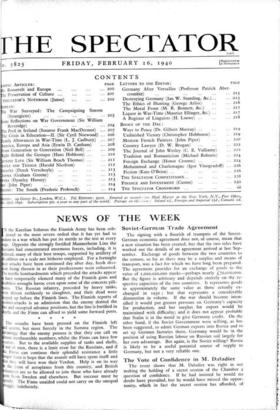Soviet-German Trade Agreement
The signing with a flourish of trumpets of the Soviet- German economic agreement does not, of course, mean that a new situation has been created, but that the two sides have worked out the details of an agreement arrived at last Sep- tember. Exchange of goods between the two countries to the utmost, so far as there may be a surplus and means of transport, was a fact for which we have long been prepared. The agreement provides for an exchange of goods to the value of 1,000,00000o marks—perhaps nearly £70,000,000. But the figure is arbitrary and depends entirely on the re- spective capacities of the two countries. It represents goods to approximately the same value as those actually ex- changed in 1931 ; but that represents a considerable diminution in volume. If the war should become inten- sified it would put greater pressure on Germany's capacity for production, and her surplus for export would be maintained with difficulty; and it does not appear probable that Stalin is in the mood to give Germany credit. On the other hand, if the Soviet Government were willing, as has been suggested, to admit German experts into Russia and to set up German factories there, Germany would be in the position of using Russian labour on Russian soil largely for her own advantage. But again, is the Soviet willing? Russia is likely to be a useful potential source of supply to Germany, but not a very reliable one.






































